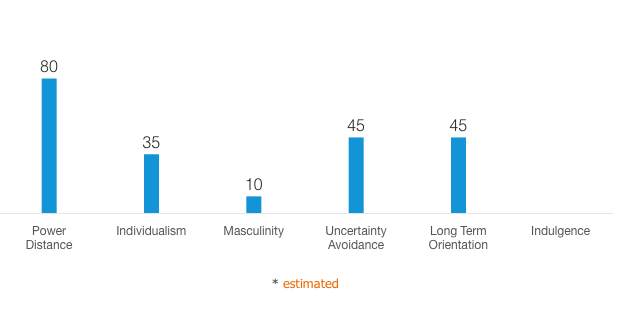
If we explore Sri Lanka’s culture through the lens of the 6-D Model
POWER DISTANCE
This dimension deals with the fact that all individuals in societies are not equal – it expresses the attitude of the culture towards these inequalities amongst us. Power Distance is defined as the extent to which the less powerful members of institutions and organisations within a country expect and accept that power is distributed unequally.
With a slightly high score of 80, Sri Lanka is a relatively hierarchical society. This means that people accept a hierarchical order in which everybody has a place and which needs no further justification. Hierarchy in an organisation is seen as reflecting inherent inequalities, centralisation is popular, subordinates expect to be told what to do and the ideal boss is a benevolent autocrat.
INDIVIDUALISM
The fundamental issue addressed by this dimension is the degree of interdependence a society maintains among its members. It has to do with whether people´s self-image is defined in terms of “I” or “We”. In Individualist societies people are supposed to look after themselves and their direct family only. In Collectivist societies people belong to ‘in groups’ that take care of them in exchange for loyalty.
A low score of 35 in this dimension means that Sri Lanka is considered a collectivistic society. This is evident in a close, long-term commitment to the member ‘group’, be that a family, extended family, or extended relationships. Loyalty in a collectivist culture is paramount and overrides most other societal rules and regulations. The society fosters strong relationships where everyone takes responsibility for fellow members of their group. In collectivist societies: offence leads to shame and the loss of face, employer/employee relationships are perceived in moral terms (like a family link), hiring and promotion decisions take account of the employee’s in-group and management is the management of groups.
MASCULINITY
A high score (Masculine) on this dimension indicates that the society will be driven by competition, achievement and success, with success being defined by the winner / best in field – a value system that starts in school and continues throughout organisational life.
A low score (Feminine) on the dimension means that the dominant values in society are caring for others and quality of life. A Feminine society is one where quality of life is the sign of success and standing out from the crowd is not admirable. The fundamental issue here is what motivates people, wanting to be the best (Masculine) or liking what you do (Feminine).
Sri Lanka, with a very low score of 10, is thus considered a Feminine society. In Feminine countries the focus is on “working in order to live”, managers strive for consensus, people value equality, solidarity and quality in their working lives. Conflicts are resolved by compromise and negotiation. Incentives such as free time and flexibility are favoured. Focus is on well-being and status is not shown or emphasised.
UNCERTAINTY AVOIDANCE
This dimension, Uncertainty Avoidance, has to do with the way that a society deals with the fact that the future can never be known: should we try to control the future or just let it happen? This ambiguity brings anxiety with it, and different cultures have learnt to deal with this anxiety in different ways. The extent to which the members of a culture feel threatened by ambiguous or unknown situations and have created beliefs and institutions that try to avoid these is reflected in the score on Uncertainty Avoidance.
The relatively intermediate score of 45 indicates that Sri Lanka does not indicate a strong preference.
LONG TERM ORIENTATION
This dimension describes how every society has to maintain some links with its own past while dealing with the challenges of the present and future, and societies prioritise these two existential goals differently. Normative societies. which score low on this dimension, for example, prefer to maintain time-honoured traditions and norms while viewing societal change with suspicion. Those with a culture which scores high, on the other hand, take a more pragmatic approach: they encourage thrift and efforts in modern education as a way to prepare for the future.
With an intermediate score of 45, Sri Lanka does not indicate a strong preference in this dimension.
INDULGENCE
One challenge that confronts humanity, now and in the past, is the degree to which small children are socialised. Without socialisation we do not become “human”. This dimension is defined as the extent to which people try to control their desires and impulses, based on the way they were raised. A tendency toward a relatively weak control over their impulses is called “Indulgence”, whereas a relatively strong control over their urges is called “Restraint”. Cultures can be described as Indulgent or Restrained.
There is currently no score for Sri Lanka in this dimension.
https://www.hofstede-insights.com/country/sri-lanka/
 would enable you to enjoy an array of other services such as Member Rankings, User Groups, Own Posts & Profile, Exclusive Research, Live Chat Box etc..
would enable you to enjoy an array of other services such as Member Rankings, User Groups, Own Posts & Profile, Exclusive Research, Live Chat Box etc.. 
 Home
Home

















